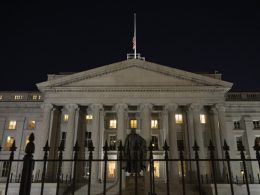Prices that people pay for a variety of goods and services rose less than expected in September, according to a Bureau of Labor Statistics report Friday that is the only official economic data allowed to be released during the government shutdown.
The consumer price index showed a 0.3% increase on the month, putting the annual inflation rate at 3%. Economists surveyed by Dow Jones had been looking for respective readings of 0.4% and 3.1%. The annual rate reflected a 0.1 percentage point uptick from August.
Excluding food and energy, core CPI showed a 0.2% monthly gain and an annual rate also at 3%, compared to respective estimates of 0.3% and 3.1%, the latter being unchanged from a month ago. Core CPI on a monthly basis had posted 0.3% gains in both July and August.
A 4.1% jump in gasoline prices was the largest contributor to a report that otherwise showed inflation pressures fairly muted. Food prices showed a 0.2% increase. Commodity prices overall rose 0.5%. On an annual basis, energy was up 2.8% and food rose 3.1%.
Shelter costs, which comprise about one-third of the weighting in the CPI, rose just 0.2% and were up 3.6% from a year ago. Services excluding shelter costs also were 0.2% higher.
New vehicles saw a 0.8% increase, but used cars and truck prices fell 0.4%.
Stock market futures added to gains following the release, while Treasury yields were slightly negative.
The report provides a glimpse into the state of the U.S. economy at a time when all other data releases have been suspended.

The BLS released the data specifically because the Social Security Administration uses it as a benchmark for cost-of living adjustments in benefit checks. Otherwise, the federal government has suspended all data compilation and releases until the fiscal impasse is settled in Washington, D.C. CPI originally was scheduled for release Oct. 15.
In addition to providing a COLA guide, the CPI release is the final significant data point the Federal Reserve will get before it makes its interest rate decision next week. The Fed has a 2% inflation goal. The headline measure was last below that level in February 2021.
Markets are pricing in a near-certainty that the central bank lowers its benchmark overnight borrowing rate by a quarter percentage point from its current target range of 4%-4.25%. Traders also are anticipating another cut in December.
However, the path after that is much less clear.
Worries persist that President Donald Trump’s tariffs could cause another round of painful inflation. At the same time, Fed policymakers worry that a slump in hiring this year could spread, though layoffs remain low.
Chair Jerome Powell and his colleagues have expressed generally cautious tones about the pace of rate cuts as they weigh the threat of inflation against weakness in the labor market. For his part, Trump has insisted that inflation is no longer a problem and the Fed should be cutting aggressively.
This is breaking news. Please refresh for updates.
Source link









